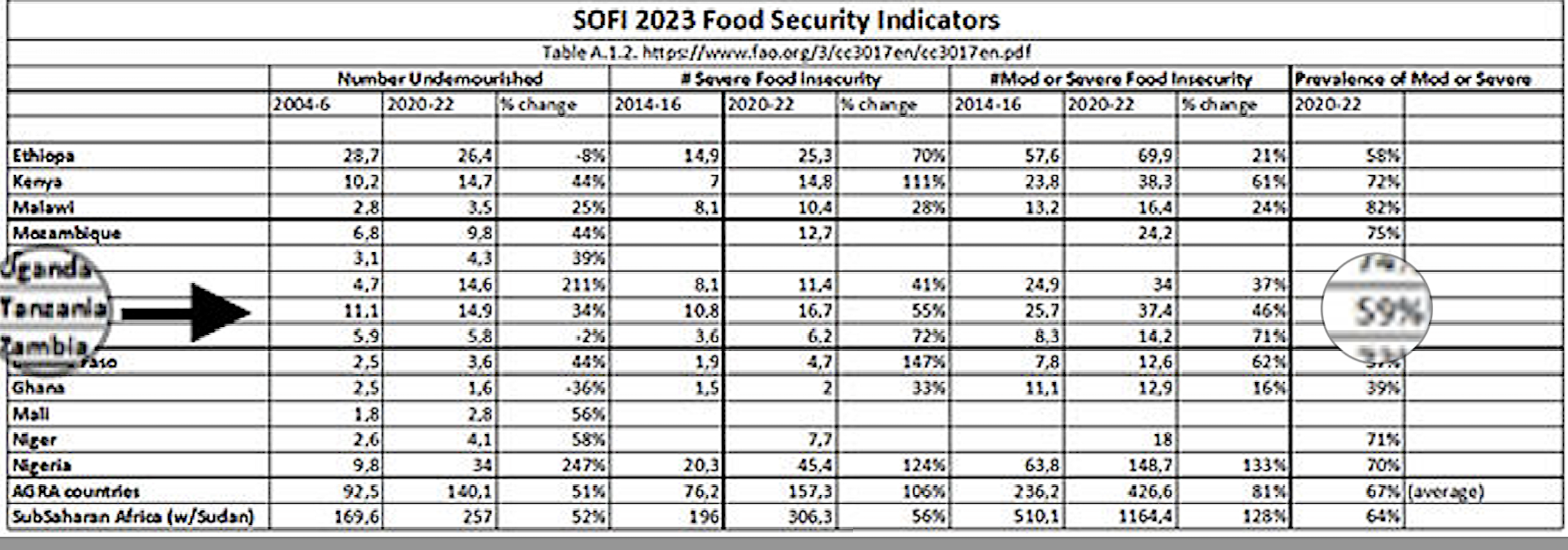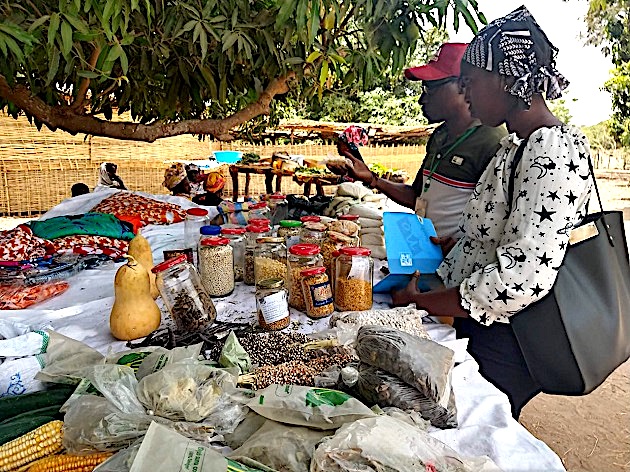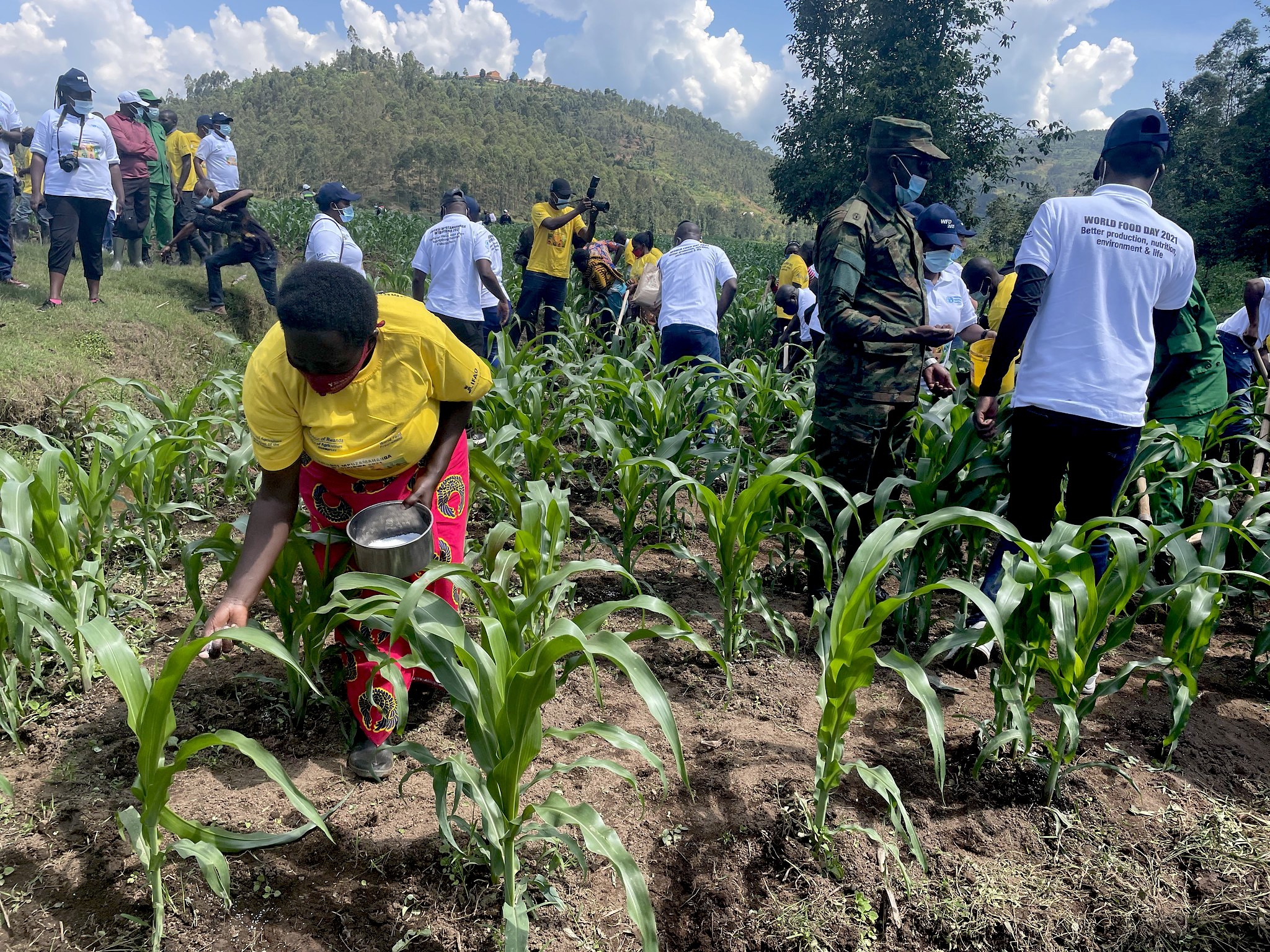International donors are not heeding African farmers’ calls to change course, writes Timothy Wise ahead of the annual African Green Revolution Forum on Sept. 5-8 in Dar es Salaam, Tanzania.

Kariakoo Market in Dar es Salaam, Tanzania, 2016. (Mitchell Maher, International Food Policy Institute, Flickr, CC BY-NC-ND 2.0)
By Timothy Wise
in Cambridge, Massachusetts
Inter Press Service
 As the adage goes, when you find yourself stuck in a hole, stop digging. As African leaders and their philanthropic and bilateral sponsors prepare for another glitzy African Green Revolution Forum, convening Sept. 5-8 in Dar es Salaam, Tanzania, they are instead handing out new shovels to dig the continent deeper into a hunger crisis caused in part by their failing obsession with corporate-led industrialized agriculture.
As the adage goes, when you find yourself stuck in a hole, stop digging. As African leaders and their philanthropic and bilateral sponsors prepare for another glitzy African Green Revolution Forum, convening Sept. 5-8 in Dar es Salaam, Tanzania, they are instead handing out new shovels to dig the continent deeper into a hunger crisis caused in part by their failing obsession with corporate-led industrialized agriculture.
Instead of cutting food insecurity in half, as the Alliance for a Green Revolution in Africa (AGRA) promised at its founding in 2006, the continent has spiraled in the opposite direction. The number of chronically “undernourished” people in AGRA’s 13 focus countries has increased nearly 50 percent, not decreased, according to recent hunger data from the United Nations.
AGRA’s corporate cheerleaders will try to blame the continent’s deepening cavern of hunger on disruptions from the Covid pandemic and the Russia-Ukraine war, but chronic hunger had already risen 31 percent by 2018 in AGRA countries, as I documented in my 2020 Tufts University study. The hole was already getting deeper.
Summit host Tanzania is a case in point. As the government readies another Green Revolution festival of self-congratulation, refusing to allow Tanzanian farm groups to offer a more critical perspective and more effective solutions, U.N. figures show a 34 percent increase in the number of undernourished Tanzanians since 2006. An estimated 59 percent of Tanzanians suffer moderate or severe levels of food insecurity, according to survey data from the U.N. Food and Agriculture Organization.
 African Farmers Say ‘Change Course’
African Farmers Say ‘Change Course’
Once again, African farmer organizations are calling on African leaders and the donors who support them to put down the Green Revolution shovels, climb out of the hole, survey the damage their failing agricultural development model has wrought, and change course to more farmer-centered and sustainable ecological agriculture.
The Alliance for Food Sovereignty in Africa concluded its recent continental meeting on seed rights denouncing “AGRA and other corporate actors’ continued pressure to influence African government seed policies and biosafety regulations to increase corporate capture and control of seed on the continent.” They held a virtual press conference on Aug. 30, demanding “No Decisions About Us Without Us!”
In calling for a strategic reset, they are not ignoring the complex causes of hunger on the continent — climate change, conflict and corruption exacerbated by pandemic disruptions and rising costs of fertilizers and food imports from Russia and Ukraine. They are recognizing that the Green Revolution’s corporate-driven, technology-based strategy for rural uplift has proven unfit to help small-scale farmers cope with such challenges.

Women share nutritious diverse local crop varieties at 2022 Djimini seed fair in Senegal. The Alliance for a Green Revolution in Africa is helping rewrite African laws and policies to favor conversion to hybrid and GMO maize seeds. (Alliance for Food Sovereignty in Africa, AFSA)
In 2006, AGRA offered a coherent strategy and admirably ambitious goals. Its aggressive promotion of commercial seeds and synthetic fertilizers would catalyze a virtuous cycle of agricultural development. Rising yields would feed the hungry and stimulate further investments in productivity-enhancing farm technologies. AGRA’s self-proclaimed “theory of change” would double food-crop productivity and incomes for 30 million small-scale farming households by 2020 while cutting hunger in half.
Seventeen years — and more than one billion dollars — later, the evidence shows that AGRA’s theory of change was flawed at every turn. Those seeds and fertilizers did not produce a productivity revolution. Yields rose only 18 percent over 14 years, barely faster than before the new Green Revolution push. Maize yields grew only 29 percent despite billions of dollars in government subsidies to allow farmers to buy — and corporations to sell — the inputs. Meanwhile, more nutritious and climate-resilient traditional crops such as millet and sorghum saw yields stagnate or decline as farmers planted more subsidized maize.

Participants at the World Food Day 2021 celebration apply fertilizer to maize crops in Northern Province, Rwanda. (IFPRI, Flickr, CC BY-NC-ND 2.0)
With limited yield improvements, farmers didn’t see more food or higher incomes from sales of their promised new surplus production. They saw a losing proposition, with the costs of seeds and fertilizers outpacing the expected returns from crop sales. When the subsidies were cut as government budgets were squeezed, farmers stopped buying the seeds and fertilizers and went back to their old seeds, if they had managed to save any. Many found themselves in debt after input purchases failed to pay off their investment.
Most found farmland that was now less fertile than before, the nutrients drained by monocultures of maize. The fertilizers fed the maize, not the soil, which continued to lose fertility, starved for the organic matter provided by more ecological methods such as intercropping and manure applications.
So no one should be surprised to find hunger on the rise. Farmers were not growing much more food. What food they were growing — mostly starchy staples like maize and rice — were less nutritious than the mix of crops they used to grow. And they had little new cash income to purchase more food, never mind a diverse and nutritious diet. Many had less cash as they tried to pay off debts from their failed investments in commercial seeds and fertilizers.
Cosmetic Changes, Less Transparency

Africa Green Revolution Forum 2022 in Kigali, Rwanda. (Paul Kagame, Flickr, CC BY-NC-ND 2.0)
International donors have failed to heed African farmers’ calls to change course. Instead, AGRA rolls out new corporate branding, a facelift not the full makeover Africa needs.
At last year’s Green Revolution Forum, attendees were treated to a slick set of videos announcing that the forum was removing the term “green revolution” from its name. Indeed, this year’s gathering calls itself the African Food Systems Summit. And AGRA itself dropped “green revolution” from its name, declaring with no real explanation that it would now just go by its acronym, AGRA.
AGRA literally stands for nothing at this point. Calling its new five-year strategy “AGRA 3.0,” leaders refuse to acknowledge the failures of their Green Revolution model. They keep promoting new versions of the same failed approaches. AGRA continues to foster pro-business policy changes within African governments, like the one it has helped push in Zambia this year. It promotes “agro-poles” — 250,000 acre “farm blocks,” often located on land grabbed from local communities so corporate investors can establish industrial-scale farms.
Like many tech upgrades, AGRA 3.0 gives African farmers less of what they really need, not more.
This year, AGRA’s cosmetic changes include a newly redesigned web site, replete with AGRA’s new logo but missing even the rudimentary progress reports it used to make available to the public. Scrubbed from the site — or conveniently buried in it — is last year’s damning donor-commissioned evaluation, which highlighted AGRA’s many failures to deliver on its promises.
African farmers have a different vision. They want donors and governments to stop supporting the failing Green Revolution initiative and instead shift their support to lower cost, farmer-centered, ecological agriculture. Farmers are producing their own organic fertilizers and pesticides from local materials, with excellent results. The simple and low-cost innovation of “green manure-cover-cropping” has scientists working with some 15 million small-scale maize farmers in Africa to plant local varieties of trees and nitrogen-fixing food crops in their maize fields, tripling maize yields at no cost to the farmer.
The solutions are at hand. It is past time for Green Revolution promoters to put down the shovels and stop digging Africa deeper into hunger.
Timothy A. Wise is senior adviser at the Institute for Agriculture and Trade Policy and a senior research fellow at Tufts University’s Global Development and Environment Institute.
This article is from Inter Press Service.
The views expressed are solely those of the author and may or may not reflect those of Consortium News.

The west is only interested in dominance and more so money, capital. People do not fit in this vision, they and their efforts are invisible.
Our industrial farming is poisoning US and waisting our water and top soil.
The people, people of Africa if left alone and our resource robbers left could teach US how to manage.
well
The white West is only interested in its own well being – regardless off of whose back. Are donors really so selfless they don’t expect anything in return??? The West’s white vest is full of spots.
In Canada, I am beginning to wonder if the wonders of the Green Revolution has produced an epidemic of obesity? More and more people are connecting the two, but all the evidence is antidotal.
I observe the following:
– more and more people are obese an on a scale that cannot be explained by lack of exercise.
– food from the grocery store no longer has any taste. It more and more resembles cardboard. If you doubt me, go buy some strawberries from the grocery store, and some strawberries from a local farmer and do the taste test. The results will speak for themselves.
As to proving this, that would require money for research……
I think obesity in North America has far more to do with processed foods than with the quality of fruits and vegetables. Most people don’t cook anything with raw foods or cook from scratch anymore. Instead, everything we eat is ultra-processed and refined.
Big Sugar also has a hand in it, with the vilification of dietary fats and the creation of ‘zero fat’ alternatives that are little more than pure carbs and sugars.
did you do the taste test?
“…at no cost to the farmer.” Therein lies the problem for the greed driven. Like peace, corporations and their minions can’t make money of simplicity. Getting the urban population to understand this is the huge challenge for not only Africa, but hugely so in the US and EU.
You have zeroes in on the dead-end truth: AGRA is just the instrument for western based industrial agriculture to open new profitable markets. They did the same thing in India – much failure, much desperation, and finally suicide.
AGRA, funded by the Gates Foundation and Rockefeller Foundation, was founded as a front for the BIOTECH/GMO industry. There were even plans for planting GM tree crops. It had nothing to do with improving farming practices or enhancing Africa’s food security but creating destitution and debt peonage while poisoning the soil and people’s health. It’s distressing to see the new hunger stats. Fortunately, new grassroots groups sprouting across Africa are trying to counter this. Timothy Wise’s research at Tufts has been very important in pushing this along. Another group working in a somewhat similar area is the Oakland Institute, which just came out with “Green Colonialism 2.0: Tree Plantations and Carbon Offsets in Africa.” The Climate Agenda is beset with fraud.
AGRA, by the way, is a partner organization with the transhumanist-pushing World Economic Forum (Davos elites). As with much of pharma, the science behind GE food crops is highly corrupt. It’s been almost impossible for independent scientists studying GMO impacts to get published. Ever since the Clinton era, the U.S. Department of Agriculture has been allowed to approve new GE seeds without requiring independent testing. Monsanto, Dow and many other AG chemical companies trace their origin to IB FARBEN, the Nazi conglomerate. Same with Pfizer and much of Pharma.
It’s time to rein in Philanthropic villains who underwrite insidious corporate agendas and do not have the people’s interests at heart.
Probably most CN readers know that the “Green Revolution” was a move to stabilize empire and corporate penetration of post-colonial countries against the “red” revolutions of national and economic independence or egalitarianism that were or were called communist.
The seeds distributed were hybrid or GMO seeds that are generally sterile in the second generation. They were of strains bred or distorted to produce with but only with certain artificial inputs: pesticide, herbicide, fungicide, and petroleum-intensive synthetic NPK fertilizer.
These products and practices reduce the fertility of soil over a handful of years, so that initial cosmetic increases in production taper off. These “increases” are cosmetic in that the destruction of soil and provocation of artificial growth results in enormous reductions of nutrition in the harvested produce. They also poison soils, aquifers, livestock–and, of course, shortly thereafter, populations.
Paired with waves of IMF and WB financial policies, these led to amplified and odious financial debts and waves of suicides in many rural communities. With similar “factory farming” practices, it led to the loss of over 90% of varietals of plants used as food over the course of the latter 20th Century (to be specific, that’s varietals, not species).
We can create regenerative ecosystems that supply humans. With some significant adjustments, we can do it locally, where people live, in back yards and banlieus and green belts. as this was done in many areas through the 19th Century. Among other things, doing so involves huge reductions in transport mileage with vehicles powered by gasoline or largely nuke-generated electricity. It can and usually does involve the sequestration of multiple tons of carbon per acre. Given perennial crops, this sequestration becomes stable.
It is probably worth observing that the current wave of revolts spreading across Africa is spreading across the region of the Sahel, the very area where this so-called “green” so-called “revolution” agricultural malfeasance is causing the rapid expansion of the Sahara desert and with that, the destruction of the livelihoods of local populations.
The time has come to revise practice all across the empire, not just at its points of most intense “post” colonial extraction. We are all victims of the mistreatment of the Earth and of iniquity between peoples, even the participants in mayhem.
Someone must have done a study on the cross-pollination efficacy of the GMO maize. That alarms me. I do know corn pollen travels far.
I grow Mandan Bride, an Indian flint corn for grinding. When I save the seed, it can be replanted another year. This year, a neighbor is growing sweet corn, so my seed genetics will not be as pure.
I am assuming some of those African growers used to do the same: Save some of the seed for re-planting. The variety then gradually acclimatizes to the environment. The cost to do so is basically zero, while that nasty GMO seed is very expensive. Hybrid seed will also not produce true to form. Seven years to select & stabilize it.
I am of the subjective opinion that the alarming obesity rate in the US is due to GMO maize, and its hideous offspring: GMO corn syrup.
I find it hard to believe that NOTHING seems to have been done to overcome the Western style “progress” I remember from my days as an agriculture student in Australia in the 1950s. We’ve been through the Green Revolution, hybrids, “better varieties” of course from the rich West, advice from outside, while people like Vandana Shiva have relentlessly shown how local farmers often have the best methods of providing for the populations in their regions rather than selling cash crops and importing staples, becoming reliant on the outside. Africa I hope is at last going to act in the interest of the people in every part of the continent.
Tnx Mr Wise 4 outing a modern example of classic Afroscrewem Euro-American policy… & CN for ur usual truthtell pub standards (actually UNusual given typical MSM “NEWS” standards).
This commenter believes historic resource theft (w/ added bigbux slave trade dynamics) tells us: “Hey, we just gotcher capitalist biz as usual heah folks!”
Also believe much of the mentioned industrial agro thrust generated by a certain (unnamed) NGO Foundation… ($tockholder demands at work?)
Far as the frankenseed phenom…
Should I name names?
Wouldn’t be the 1st… that’s for damn sure… So…
Monsanto!